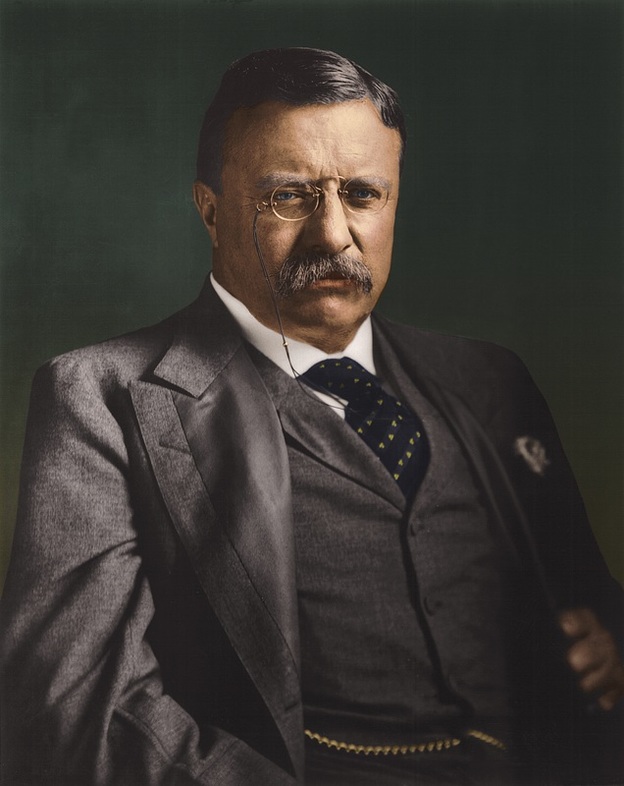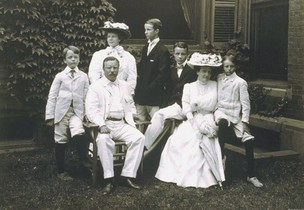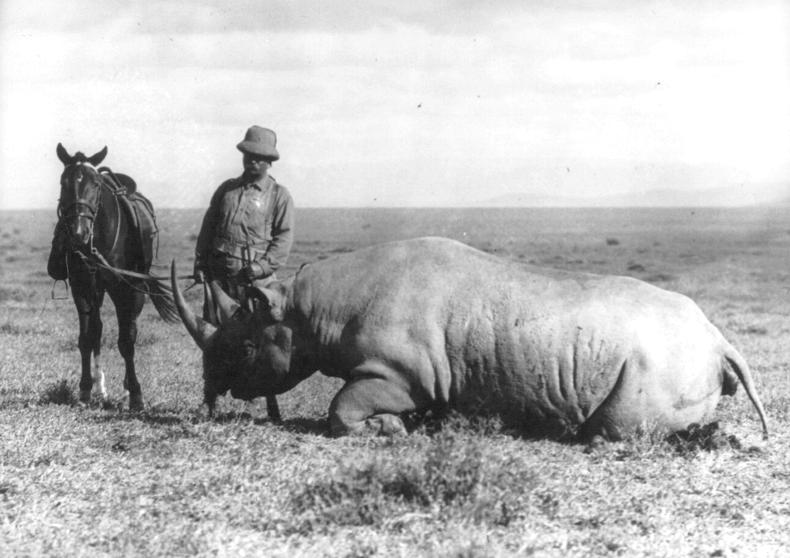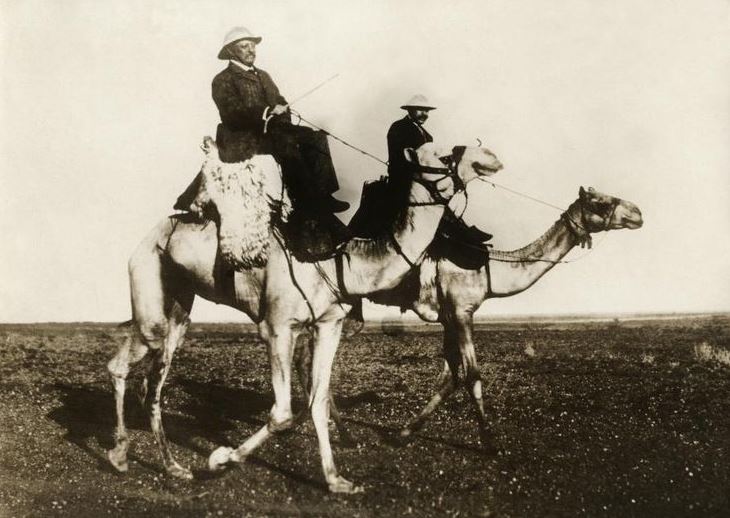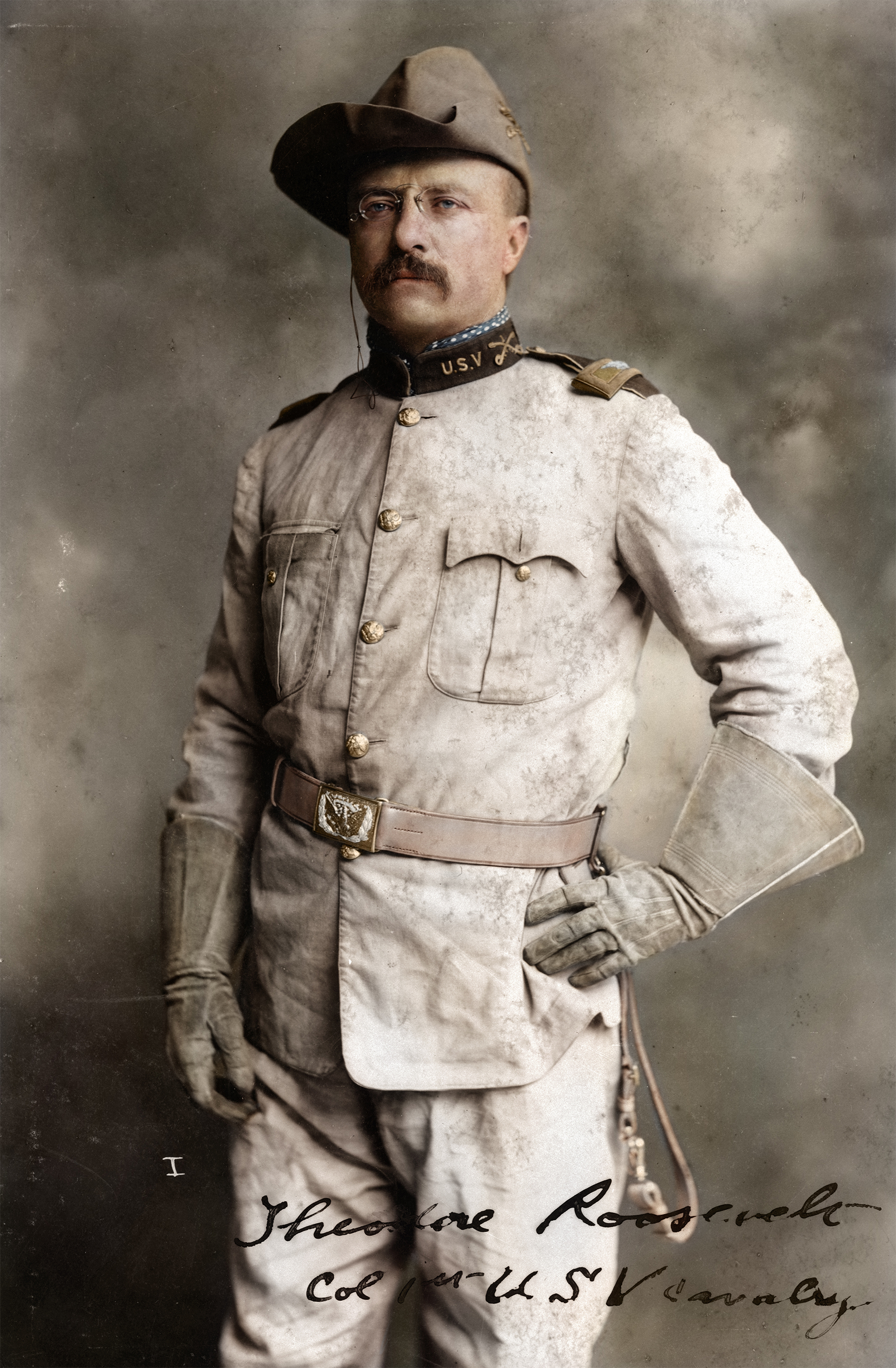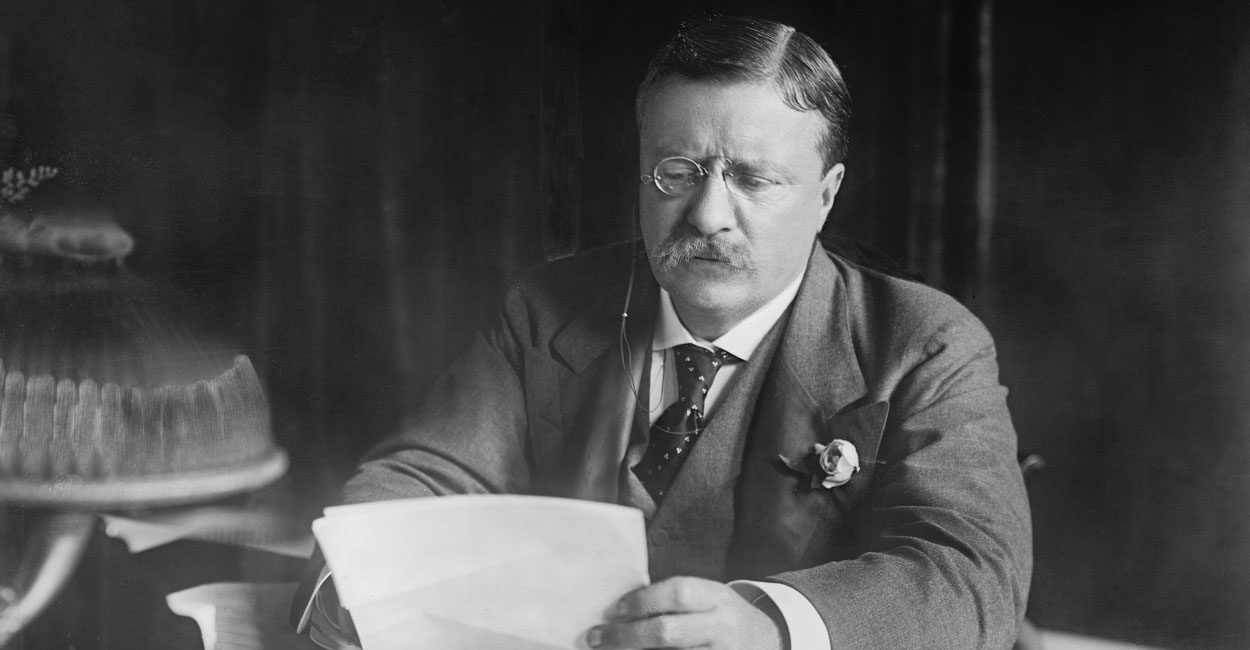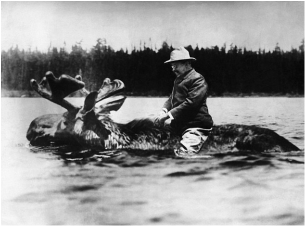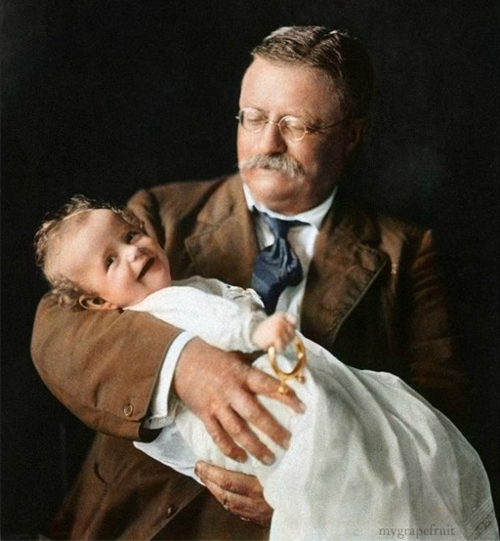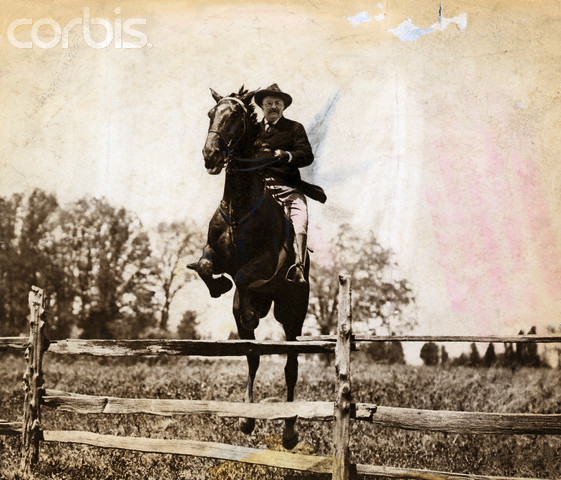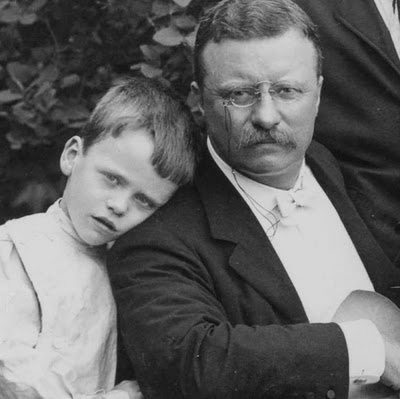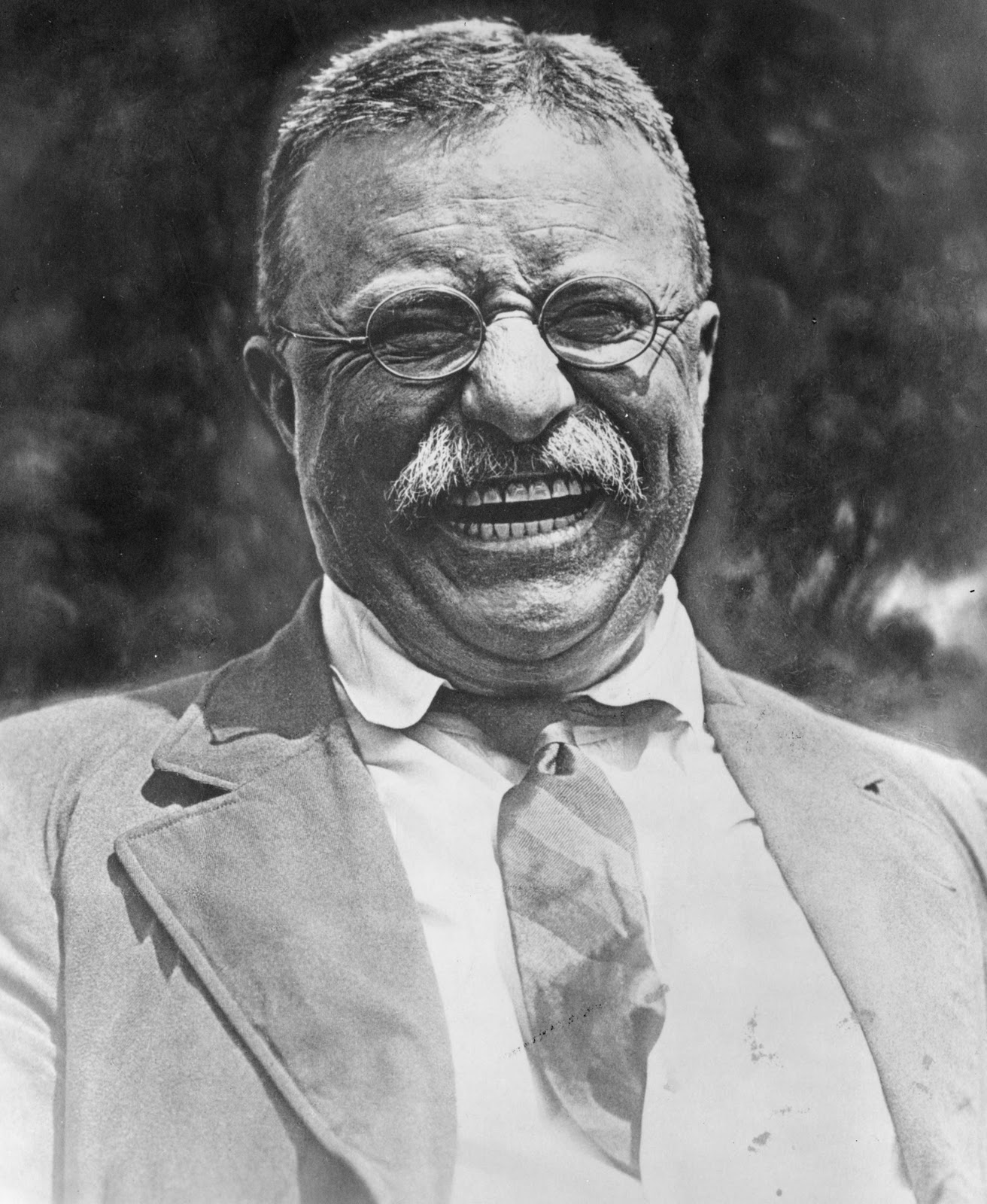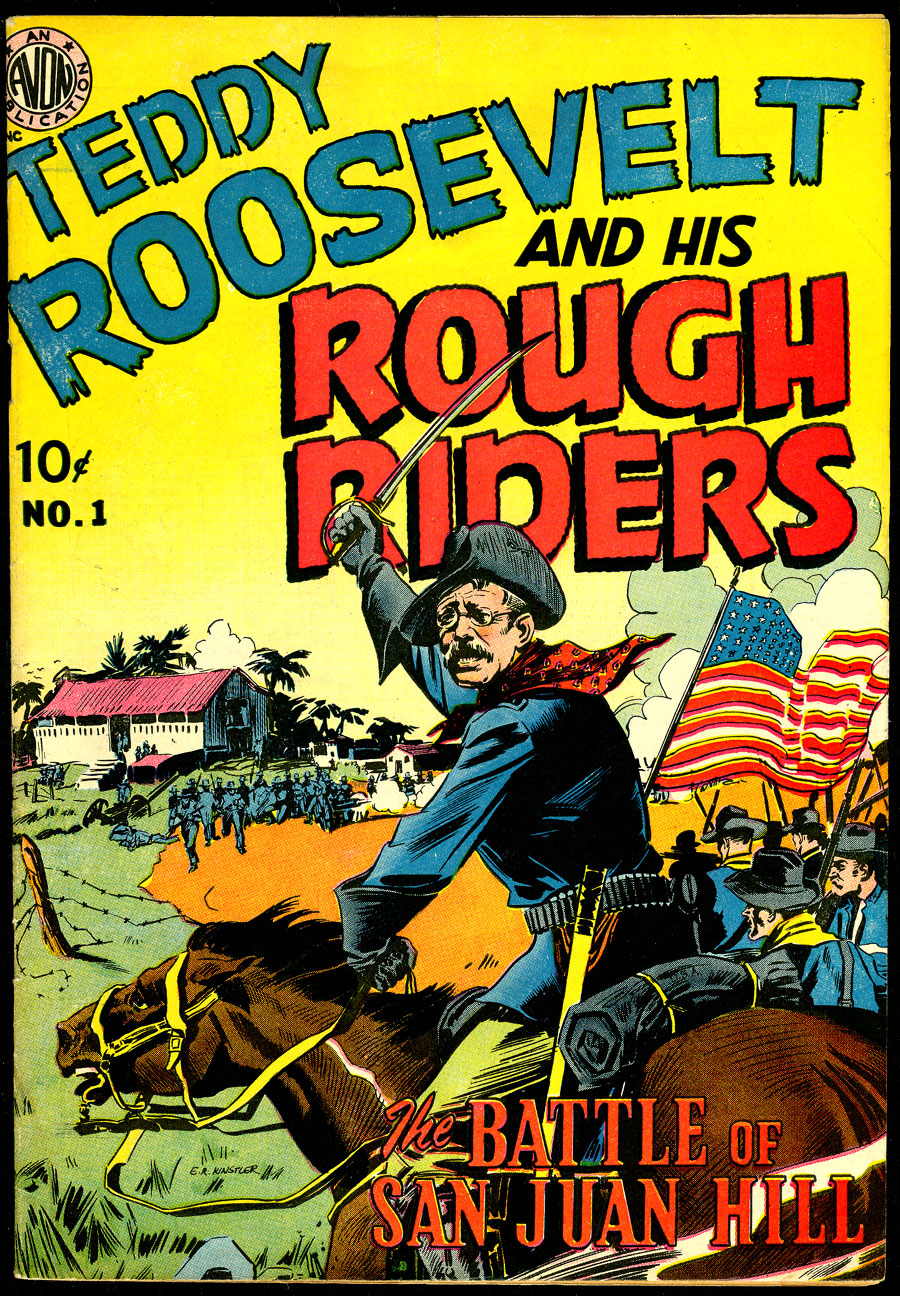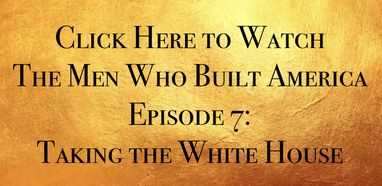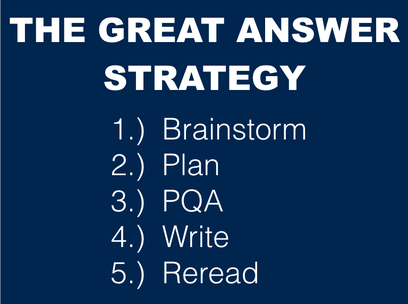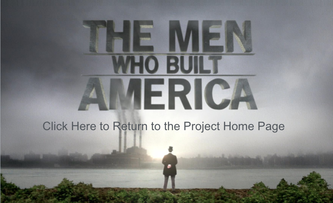Project: The Men Who Built America
EPISODE 7
TAKING THE WHITE HOUSE
The Gilded Age
EPISODE 7 MISSION
Directions: Write the episode mission below in the "Episode Mission" box of your Episode 7 Lesson Chronicles.
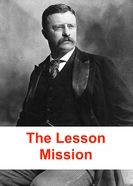
I can tell you the part that Theodore Roosevelt played in building America.
EPISODE 7 OVERVIEW
Directions: Read the Episode 7 Overview below.
Vanderbilt, Rockefeller, Carnegie and Morgan have gone unchecked for decades, but American politicians are about to change that. They want to stop the monopolies and the abuse of power in business. Business tycoons Rockefeller, Carnegie, and Morgan who have been lifelong enemies will come together with a play to gain influence in the White House. Their candidate, William McKinley, wins the White House and passes laws that favor big business. Morgan and Carnegie create U.S. Steel, the first billion-dollar company in the U.S. while Rockefeller takes control of 90 percent of North American oil. But just when things look like they are going to be fine, McKinley is assassinated. Vice President Theodore Roosevelt becomes president and his presidency will rock the powerful business tycoons to their core!
EPISODE 7 VOCABULARY WORDS & TERMS
Directions: Use the terms below to complete the Episode 7 Vocabulary Section in your Episode 7 Chronicles by matching the correct vocabulary word to the definition that matches it. Then complete the Episode 7 People Section in your Episode 7 Chronicles by completing the Episode 7 Crossword Puzzle.
|
administration: a group of people who manage a company, school, organization or a government that is identified with its leader. For example: the Obama Administration
anarchist: one who uses violent means to overthrow the established order anti-trust: any person or law that is against forming trusts or monopolies aristocrat: the highest social class who have more money and power than the other people in a society assassin: a person who kills a famous or important person, usually for political reasons or money William Jennings Bryan: the Democratic candidate for President of the United States in 1896 that vowed to put an end to the big business, the country’s monopolies and corrupt big business practices Andrew Carnegie: a Scottish born immigrant who became the major steel industry tycoon and one of the wealthiest men during the Gilded Age coercion: to make (someone) do something by using force or threats conglomerate: a large business that is made of different kinds of companies consolidate: to join or combine business together into one big business controlling interest: control over a company because you own the most stock in the company correspondent: a person whose job is to send news to a newspaper, radio station, or television program often from different places around the world credibility: having the quality of being a person who is right, believable, truthful, or honest Leon Czolgosz: the man who assassinated William McKinley Democrats: one of the two major political parties in the United States that is for larger government programs and higher taxes and are often called liberals dismantle: to take apart so that it is in separate pieces Thomas Edison: famous inventor and innovator that created the first manufactured light bulb and was the first to establish the electric lighting system that brought electricity and light to homes and businesses; proponent of the DC electrical current for providing electricity elite: the people who have the most wealth and status in a society : the most successful or powerful group of people foreman: a person who is in charge of a group of workers Henry Frick: chairman of Carnegie Steel involved in the Johnstown Flood of 1889 and the Homestead Steel Mill Strike of 1892, in Homestead Pennsylvania gold standard: a monetary (money) system where a country's paper money has a value directly linked to gold industrialist: someone who owns or manages an industry manipulate: to control something or someone to your advantage, often unfairly or dishonestly William McKinley: the Republican candidate in the 1896 presidential election that won the presidency mainly because his campaign was funded by big business leaders J.P. Morgan: an American financier and banker who controlled corporate finance and industrial consolidation and introduced electrical lighting to households around the world when he funded Thomas Edison’s electrical lighting system, grids, and power stations negotiating: when two or more groups or people work together to make an agreement that all groups can be happy with nemesis: a rival that is difficult to defeat net worth: the total amount of money that a person has when you cash out everything they own poverty line: when a family’s income is less that what they can live on prohibitionist: someone who supports laws to make producing and selling alcohol illegal in the U.S. prosperity: the state of being successful usually by making a lot of money renounce: to say in a formal way that you refuse to follow, obey, or support someone or something any longer Republicans: one of the two major political parties in the United States that is for smaller government and lower taxes and are often called conservatives John D. Rockefeller: owner of the Standard Oil Company who became the first oil tycoon when he gained a monopoly on American oil Theodore Roosevelt: Vice President of the United States who became the President after the assassination of William McKinley that filed anti-trust suits against the major industrialists Charles Schwab: the president of Carnegie Steel that helped negotiate the sale of Carnegie steel to J.P. Morgan Spanish-American War: a war between Spain and the United States, fought in 1898 that began as when the United States tried to help Cuba win their independence from Spain subpoena: a written order that commands someone to appear in court to give evidence suit: a process by which a court of law makes a decision to settle a disagreement or problem between people or organizations trademark: a quality or way of behaving, speaking, etc., that is very typical of a particular person, group, or organization trust buster: a government official who took big business monopolies to court for breaking antitrust laws trusts: partnerships between big corporations in an industry where the stocks of all the companies involved in the partnership are combined and a group of people are selected to manage and control the combined stocks wealth distribution: the way the money in a nation is divided among groups of people whistle-stop press tour: a style of political campaigning where the politician makes a series of brief appearances or speeches at a number of small towns over a short period of time |
EPISODE 7 GUIDE
Directions: While Watching Episode 7: Taking the White House, answer each of the following questions in the "Episode Guide" section of your Episode 7 Lesson Chronicles. You should read one question ahead so that you are always listening for the answers you need. If you are absent, you can view the Episode by clicking on the link below.
- At the peak of their power, J.P. Morgan, John Rockefeller and Andrew Carnegie are worth the modern equivalent of over $1 trillion dollars combined. More than the entire __________________ of the 40 richest people alive today.
- The gap between the rich and the poor is as big as it's ever been. Over _____________ of Americans survive on less than ____________ per month, while the average worker earns barely a dollar a day - well below the poverty line.
- Bryan's emergence is the biggest threat the Titans have ever faced. He promises to __________________ their companies and to not rest until they're behind bars.
- Desperate to protect the empires they've spent their lifetimes building the titans throw their full support behind the candidacy of Ohio Governor, _______________________.
- Bryan fights back. He undertakes the country's first _______________________ Cross-crossing the nation and talking directly to the people. The tour becomes the model for the way presidents campaign today.
- On election day the lines are drawn. It's ________________ versus _________________, rich versus poor.
- Morgan had much more power than he had wealth and he understood that he could have more influence over the ____________________ than Rockefeller, than Carnegie, than just about anybody else.
- If Morgan can ____________________ steel, he could potentially create the largest corporate empire in the world. But do to that, J.P. Morgan will need to pull off his biggest and most daring move yet - a complete takeover of Andrew Carnegie's empire.
- Morgan knows he can't go after Carnegie directly. He needs another way in. So he sets up a meeting with Carnegie's right-hand man, _______________________.
- Carnegie writes down 480 million on a piece of paper. It's the equivalent of 400 billion today - more than Gates and Buffet together. Carnegie has dared J.P. Morgan to buy him out for an outrageous price. A sum that is higher than the entire budget of the __________________.
- For 30 years Andrew Carnegie has battled John D. Rockefeller for the title of America's richest man and now he's finally surpassed him. The deal gives Carnegie a personal net worth of _________ in today's money. The largest private fortune the modern world has ever seen.
- J.P. Morgan calls his new company, ____________. It's instantly the biggest corporation in the world. The first company in history to be worth more than 1 billion dollars and it will dominate the steel business for almost 100 years, virtually unchallenged.
- As governor of New York, ________________ passes laws clamping down on big business. His biggest targets are the nation's most powerful monopolies and the men behind them.
- President William McKinley is re-elected to a second term and aspiring _________________ Theodore Roosevelt is installed as Vice President.
- Leon Czolgosz is a former factory worker who recently lost his job at a company J.P. Morgan took over during the creation of U.S.Steel. As Czolgosz struggled, he took refuge in the growing _______________ movement.
- For America's most powerful men, it's the worst case scenario. An assassin's bullet has robbed them of their president, a man they spent millions to get elected and with his death their worst enemy comes to power. Teddy Roosevelt is about to become the leader of _______________________.
- Roosevelt insisted that the big capitalists recognize that they were mere capitalists and that the ___________________ of the country, were the ones that the people had chosen.
- Roosevelt quickly launches a campaign against the nation's largest trusts and his first target is a railroad _________________ owned by J.P. Morgan.
- Roosevelt refuses to back down from Morgan. He sues his company in Federal court in the first government ___________ filed against a major corporation. Roosevelt goes on to win and Morgan's railroad monopoly is broken up.
- The Government files suit against Standard Oil--in what promises to be the biggest anti-trust case of all time and the government is hoping their lead witness will be John D. Rockefeller himself. The feds issue a ________________ and Rockefeller goes on the run; from California, to Maine, to Key West The most powerful man in America has become a fugitive from justice.
EPISODE 7 DISCUSSION QUESTIONS
Directions: After Watching Episode 7: Taking the White House, you will participate in a small group discussion. In your groups, you will use our "Great Answer Strategy" to discuss and answer the following questions in the Discussion Questions Section of your Episode 7 Lesson Chronicles.
The Great Answer Strategy
Discussion Questions
- What did William Jennings Bryan want to do if he won the presidential election of 1896?
- What did Andrew Carnegie, John Rockefeller, and J.P. Morgan decide to do when William Jennings Bryan announced he would be running for president in the 1896 election?
- Who was Theodore Roosevelt? Why did Roosevelt scare Carnegie, Rockefeller, and Morgan?
- How did Theodore Roosevelt help to build America?
EPISODE 7 INVESTIGATION
We will not do an investigation activity for this Episode.
END OF THE EPISODE 3 LESSON
Directions: You have completed the Episode 7 Lesson of the Men Who Built America Project. Click on the icon below to go back to the Project Homepage.
